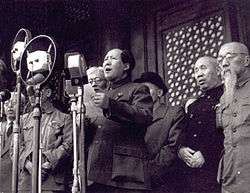Wartime perception of the Chinese Communists

The Wartime perception of the Chinese Communists was a matter of debate in the United States before and during World War II in both the public and the government. The debate revolved around the post-war character and intent of the Communist Party of China, as an "agrarian reformer," a European-styled socialist nation that would preserve levels of capitalism for an extended time until a peaceful transition to a fully realized communist society; or as a Marxist like communist party which would enact violent change in the same manner as the Bolsheviks in the Union of Soviet Socialist Republics.
Pre-War perception
For a more detailed history, see Communist Party of China
Founded in 1921, the Communist Party was initially allied with the Kuomintang until the second half of the 1920s, when it was purged from membership within the unified national government under Chiang Kai-shek. In 1934, the party nearly annihilated, the rememnants under the guidance of future Chairman Mao Zedong launched an ambitious march to escape destruction by the Kuomintang. The resulting action became known as The Long March. It was through the Long March that the United States, and much of the Western world, was first introduced to the communists in China via Red Star Over China, a narrative of the march and introductory biography for several Communist leaders, by the American journalist, Edgar Snow.
Snow's work cast the communists in a positive light and as those who wished to reform their country.
See also
- Communist Party of China
- People's Republic of China
- History of the People's Republic of China
- Chinese Civil War
- Dixie Mission
- China Hands